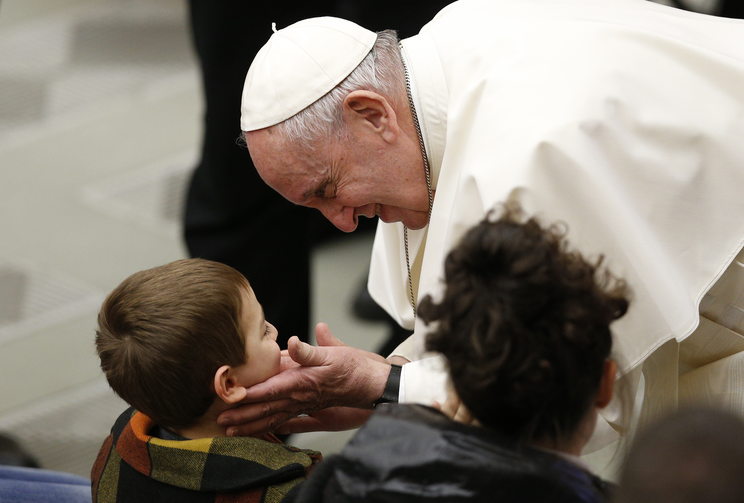5 lessons that Pope Francis taught us with gestures and not with words

Friday 13 March marks the seventh anniversary of the papacy of Francis. Over the past seven years, Pope Francis has introduced and disseminated memorable phrases that inspired the church. His call to build a "revolution of tenderness" reminds us that mercy is who God is and what God wants for and from the people of God ("Evangelii Gaudium", n. 88). Francis invited all people of goodwill to create a "culture of encounter" (n. 220) that resists the modern "disposable culture" ("Laudato Si", "n. 22), affirms human dignity and promotes the global common good.
But despite all its pithy lines, the papacy of Francis has been characterized only by powerful gestures and actions that include a pedagogy of mercy. Reflecting on Jesus' teaching and healing ministry, Francis teaches through a series of richly symbolic pastoral actions. Here are five examples for our reflection, discernment and emulation.
Humility:
The name chosen by Pope Francis indicates his commitment to humility and simplicity, as well as his particular concern for the poor and the planet. Upon his election as pope, Jorge Mario Bergoglio decided to take the name "Francesco" following a hug with his friend, the Brazilian cardinal Cláudio Hummes, who insisted: "Do not forget the poor. “During his introduction to St. Peter's Square, Francis broke the tradition by asking the 150.000 people gathered to pray for him before offering his first blessing as pope.
The name chosen by Pope Francis indicates his commitment to humility and simplicity, as well as his particular concern for the poor and the planet.
When he was introduced to his cardinal brothers, Francis refused to use a platform to rise above them. Francis chooses to live in a small suite in the Vatican pension rather than in the apostolic palace. He goes around the Vatican in a Ford Focus and often uses a Fiat for his international tours instead of an extravagant limousine or gas SUV
On his first Holy Thursday as Pope, Francis washed the feet of 12 criminals, including two women and one Muslim. This humble gesture - perhaps more than any homily or pastoral letter - gave birth to John 13. With these tender actions, Francis shows us what it means to listen to Jesus' command: “Just as I loved you, you too should love one another others "(Jn 13,34:XNUMX).
Inclusion
Francis' default is to include and encourage rather than exclude and condemn. In his weekly appointments, he plans time to meet bishops who have been publicly critical of his leadership, not to scold them but to talk together. Francis continues to meet clergy survivors and their relatives as part of his personal commitment to complain and atone for the church's inability to protect vulnerable children and adults.
The default setting of Pope Francis is to include and encourage rather than exclude and condemn.
He expressed his intention to include more women in decision-making roles, demonstrated by Francesca Di Giovanni's appointment to a senior role in the Secretariat of State earlier this year. Francis modeled inclusion through his warm embrace of individuals disfigured by illness, people with special needs and young children; his birthday parties include hospital patients and homeless people. On his 2015 visit to the United States, he spent his last day with 100 inmates in a Philadelphia detention center, inviting all citizens to facilitate the recovery and return of incarcerated people.
Jesus' contemporaries sometimes retreated in the way he ate with sinners and marginalized people. When Jesus is invited to stay at Zacchaeus' house, the crowd grumbles in disapproval (Lk 19, 2-10). Just as Jesus reached even those considered insignificant and unworthy, Francis extends God's welcome to all.
To listen
The enduring legacy of Pope Francis could arise from a number of synods that created the conditions for a "Church that listens more" ("Christus Vivit", n. 41). As highlighted by the synodal meetings to discuss marriage and family life (2015 and 2016), young people and vocation (2018) and the Pan-Amazon region (2019), Francis shows that inclusion is not a simple tokenism but a path for a "rebirth of hope" ("Querida Amazonía," No. 38) through dialogue, discernment and collaboration for courageous action. "Synod" means "traveling together", a commitment to accompany, consult and reinforce each other in fully aware and active participation in being a church together. Francis shows us that we shouldn't be afraid of disagreement; his example in listening resists the hegemonic beliefs and structures that allow clericalism and hierarchism.